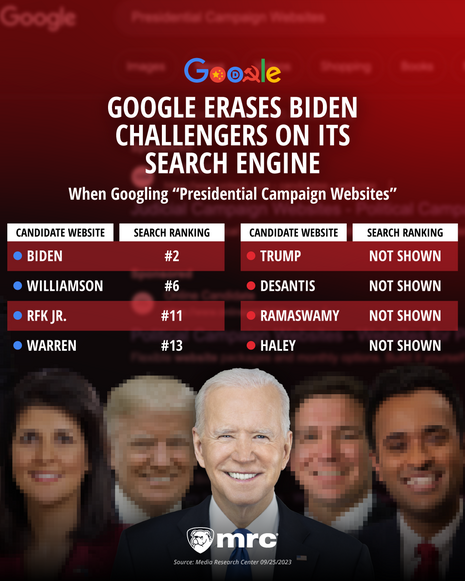Table of Contents
Gabriela Pariseau
Gabriela is an Assistant Editor in the Media Research Center’s Free Speech America division. She is a graduate of Christendom College where she earned a B.A. in History. Gabriela has also contributed to The Catholic Register, Arlington Catholic Herald, Students For Life of America and Iowa Right to Life.
Is Google shilling for Biden? It appears so, as its search engine once again buried Republican “presidential campaign websites.”
Google’s search engine failed to produce even-handed results in multiple searches performed by MRC Free Speech America over the course of a week prior to today’s Republican presidential primary debate. Researchers broadly searched for “presidential campaign websites” as well as two additional searches specifying the party affiliation of the candidates. When MRC searched for “republican presidential campaign websites,” only two candidates’ websites appeared on the first page in the search results — a Democrat candidate and a Republican who is polling at less than half a per cent.
Democratic Party candidate Marianne Williamson’s website somehow found its way onto the first page. So did Will Hurd, who has yet to garner enough support to make it to the debate stage. His website was the only Republican candidate’s website to appear in the search results. His website came up as the third result while the campaign websites of former President Donald Trump, Florida Governor Ron DeSantis, Strive Asset Management co-founder Vivek Ramaswamy, Former Vice President Mike Pence, Former United Nations ambassador Nikki Haley, Sen. Tim Scott (R-SC) and Former New Jersey Governor Chris Christie were nowhere to be found on the first page of results.
The search did include a link to a Library of Congress page that referenced Trump’s 2020 campaign website but even the link referenced was dead.
“These results are so outrageous,” said MRC Free Speech America Vice President Dan Schneider. “Google is either the most incompetent search engine on the planet, or it’s intentional. This is not a coincidence.”
Indeed, when researchers searched “democrat presidential campaign websites,” the tech giant pushed its Democratic party darlings right to the top. Google had no problem finding President Joe Biden’s campaign website, which appeared as the first search result. Williamson’s website similarly appeared as the second result. However, Biden’s most formidable challenger in the primary, Robert F. Kennedy Jr.’s website was notably missing.
In a third query, MRC Free Speech America researchers performed a search excluding party affiliation. In a search for “presidential campaign websites,” President Biden’s campaign website appeared as the second search result along with Democratic Party candidate Marianne Williamson’s campaign website, which came up as the fifth result. Sen. Elizabeth Warren’s (D-MA) 2020 presidential campaign website came up as the twelfth result for the second time now. But just as before, Google search did not produce a single Republican candidate’s website nor Kennedy’s on the first page of results. When the same query was run again five days later, Williamson and Warren were each ranked one position lower on the first page, and Kennedy’s campaign website appeared as the eleventh result.
Click HERE to read about election interference bias found in Google’s AI chatbot Bard.
Besides campaign websites, MRC Free Speech America’s search for “republican presidential campaign websites” produced articles attempting to introduce 2024 GOP presidential candidates from CNN, Politico, NBCNews and The Associated Press. Each of the liberal outlets made clear their bias against GOP front-runner and former President Donald Trump, primarily listing controversial flashpoints of his administration in their respective write-ups.
CNN, for example, characterized Trump’s criticisms of how the 2020 election was conducted as “conspiracy theories.” Meanwhile, Politico touted Trump’s alleged “numerous scandals,” while NBC and AP seemingly eagerly recounted recent criminal charges brought against the former president. CNN and Politico also touted Biden as the presumed Democrat nominee the GOP will face in 2024, not even acknowledging his two Democrat challengers.
Other search results for “republican presidential campaign websites” and “presidential campaign websites” included more neutral results: historical resources like Library of Congress archives, 4presidents.us, which archives campaign websites dating all the way back to the 1996 presidential election and the University of California Santa Barbara’s The American Presidency Project. All three searches also produced articles with tips and tricks on how to build a good campaign website.
The impact of search engine manipulation is enormous especially when it involves potential election interference. Few users click on links that don’t appear on the first page of search results, according to Brian Dean, a search engine optimization expert. Dean conducted a study analyzing how often users click on various rankings of Google search results. His blog, Backlinko, reported that less than 1 per cent of “Google searchers clicked on something from the second page.” An older study conducted by SEO software company Moz in 2014 reported that the second page receives only 3.99 per cent of clicks, indicating that the problem has worsened over time.

Methodology
For this report, MRC Free Speech America analyzed the Sept. 20 and Sept. 25 Google search results of “presidential campaign websites,” “republican presidential campaign websites” and “democrat presidential campaign websites.” MRC Free Speech America created an algorithm to automate this process in a clean environment. A “clean environment” allows for organic search to populate results without the influence of prior search history and tracking cookies.
MRC Free Speech America researchers searched the innocuous words “presidential campaign websites,” “republican presidential campaign websites” and “democrat presidential campaign websites” using the algorithm. To determine bias, our researchers looked at Google’s results and recorded the rank(s) of each candidate’s campaign website on the first page of results.







